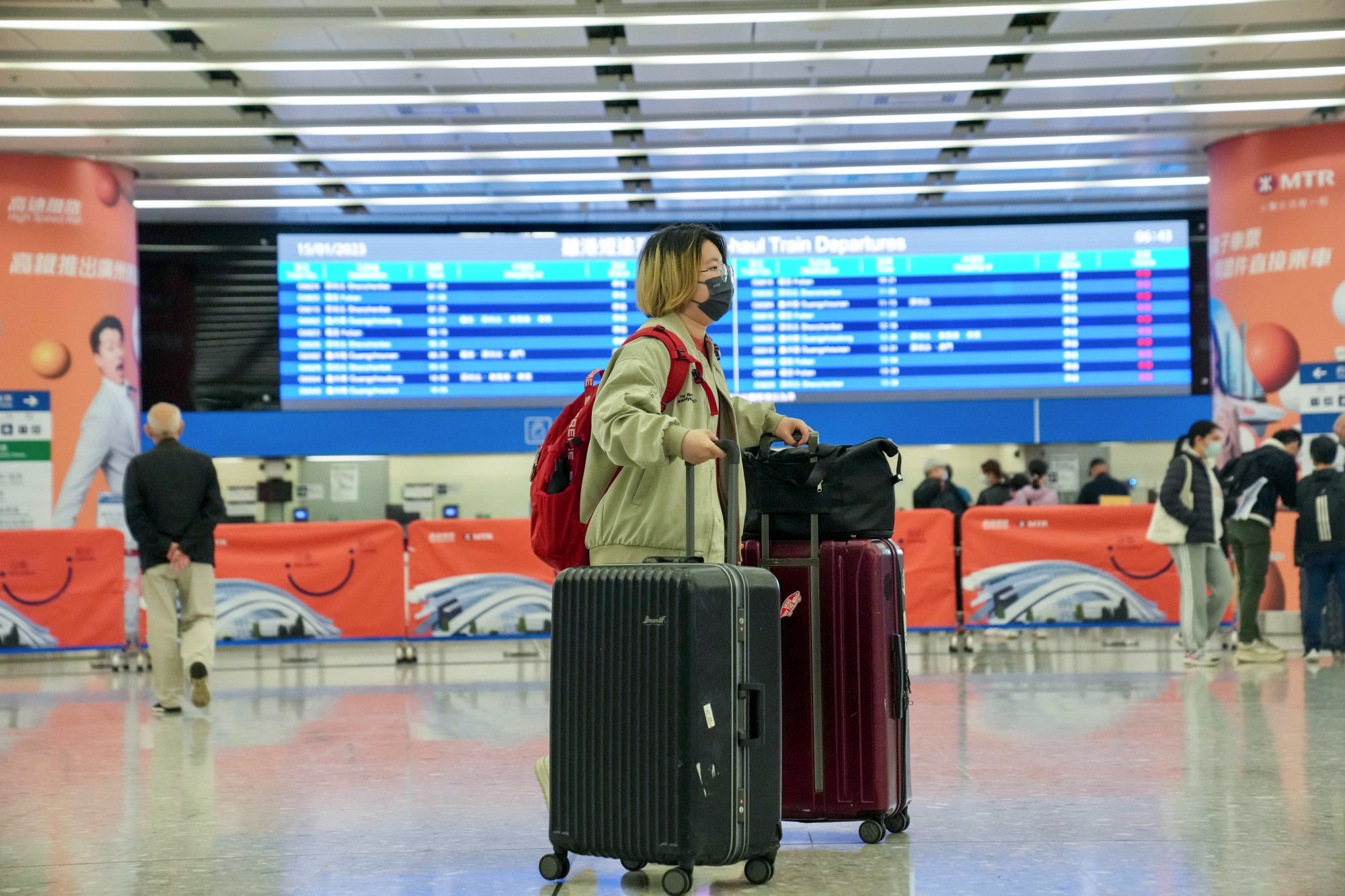
Hong Kong’s high-speed rail link resumes short-haul service 1 week shy of Lunar New Year, after 3 years of coronavirus curbs
- First passengers catch train to Guangzhou, with MTR Corp holding relaunch ceremony at 6am
- West Kowloon terminus is latest control point in city to reopen, with some 6,500 travellers arriving or departing from station as of 6pm on Sunday
Hong Kong’s high-speed rail link to Guangzhou on Sunday resumed short-haul services for the first time in three years after Beijing a week earlier scrapped quarantine for arrivals, with some travellers noting the significance of the ride in the run-up to Lunar New Year and others eager for long-awaited family reunions.
Some 6,500 travellers arrived or departed from the West Kowloon terminus as of 6pm. The control point is the latest to reopen in Hong Kong, following the earlier resumption of operations at seven others.
In the first week since the launch of quarantine-free, cross-border travel on January 8, a check by the Post found that the number of people heading to Hong Kong from mainland China had reached around 46,000, more than double the about 20,000 logged during the week before the reopening.

On Sunday, 34-year-old Heinrich Tse, dressed in a national rail company uniform, joined the early birds on the first train to leave the city at 7am and planned to spend a leisurely day in Shenzhen.
“This ride carries greater significance, being the first train returning into our country,” he noted. “It’s more exciting wearing a uniform, though I’m also worried that I may be accused of pretending to be a staff member.”
The trains only accept electronic tickets, requiring passengers to scan their identification cards at the gates and undergo facial recognition before proceeding to security checks.
Travellers were reminded that hand-sanitising gels or sprays containing alcohol were not allowed on the trains, as alcohol is listed among prohibited carry-on items.
Families, friends reunite as Hong Kong-mainland China border reopens after 3 years
The Post spent under 15 minutes crossing clearance points to the waiting hall for trains. Station staff and immigration officers were seen checking all passengers’ polymerase chain reaction (PCR) test results for Covid-19 done within 48 hours of departure, and health declaration forms on messaging app WeChat.
But a tour group of 12 guests had issues with filling in the forms with their phones and failed to catch their train to Dongguan at 8am. They eventually boarded the next train to continue their trip for a hot spring hotel visit.
It was the first cross-border tour organised by travel agency Big Line Holiday in three years, according to Lucia Chan, the agency’s marketing director.
Only short-haul trips were relaunched with three new stops in Dongguan, Dongguan South and Guangzhou East. Most tickets for the 39 short-haul departing trains and 38 arriving ones on Sunday were sold out.
Yet, the Post noticed that carriages in the first train to Guangzhou East at 8am were only a tenth full.
Meanwhile, Michael Tien Puk-sun, among a handful of lawmakers who boarded a train to observe operations, urged rail authorities to allocate more seats to meet the strong demand ahead of the Lunar New Year.
While the rail link has largely resumed short-haul services, local transport officials have yet to provide a timeline for when trains to more far-off destinations, such as Beijing, would start.
The rail link before the pandemic operated around 70 short and 13 long-haul journeys going in either direction on a daily basis.
Completed at a cost of HK$84.4 billion (US$10.8 billion) in September 2018, the Guangzhou-Shenzhen-Hong Kong Express Rail Link only ran for 16 months before it was temporarily closed in January 2020 due to the pandemic.
The MTR Corporation on Sunday said long-haul trains would be able to stop at 61 destinations on the mainland once the rail provider resumed all services.

At the terminus on the same day, a female passenger surnamed Ng, with her mother, 52, and two sons aged eight and six, were among those on a morning train to Shenzhen.
Ng boarded with her family solely to ensure they got on the correct transfer train back to their hometown of Fuzhou, the capital of southeastern Fujian province.
Ng herself said she would head back to Hong Kong for work.
“In the past, we simply took the train [for Fuzhou] right here without changing. But because trains to Fuzhou remain suspended, they have to make a connection in Shenzhen and I’m worried my mother doesn’t know her way,” she said.
Small firms optimistic about GBA prospects as Hong Kong-mainland border reopens
At the arrival hall, travellers from across the border were reaching the city as early as 8am, including Becky Luo, 29, a teacher alighting after a 24-minute ride from Shenzhen North for a family reunion.
“I haven’t seen my grandfather for three years and I am very excited now,” Luo said.
Jacky Zhang, a 29-year-old financial officer and Shenzhen resident who works in Hong Kong, said the relaunch of the link shaved about an hour off his daily commute, compared with another rail crossing at Lok Ma Chau.
“The high-speed rail is much more convenient because the West Kowloon station is closer to the business centre,” said Zhang, who worked remotely before the border reopened.
Hongkongers complain of online ticket delays, bugs on high-speed rail website
Tickets first went on sale on Thursday on the official website of China Railway Corporation and at ticket counters in West Kowloon.
On Sunday afternoon, more than 200 people queued up at the counter, including some who failed to get tickets online and others inquiring about tickets for trips the next month.
A first-class ticket from West Kowloon to Guangzhou East on Sunday cost 344 yuan (US$51) and a second-class ticket cost 215 yuan, according to an updated price list.
Additional reporting by Jess Ma




